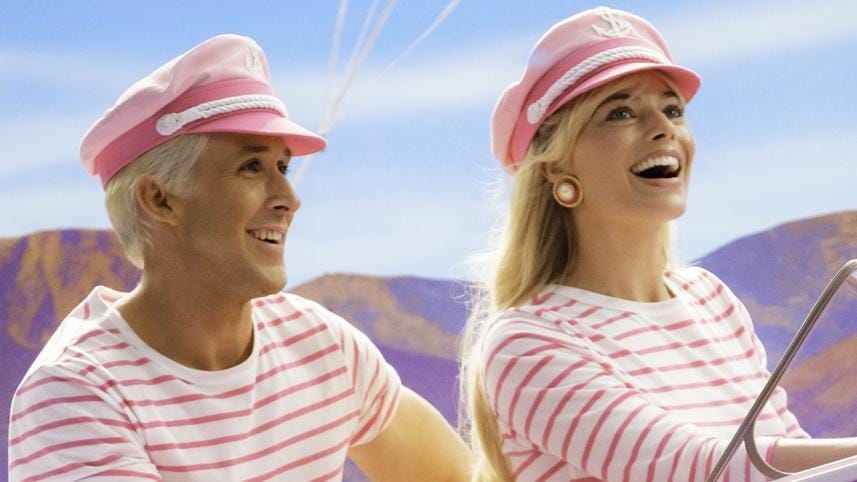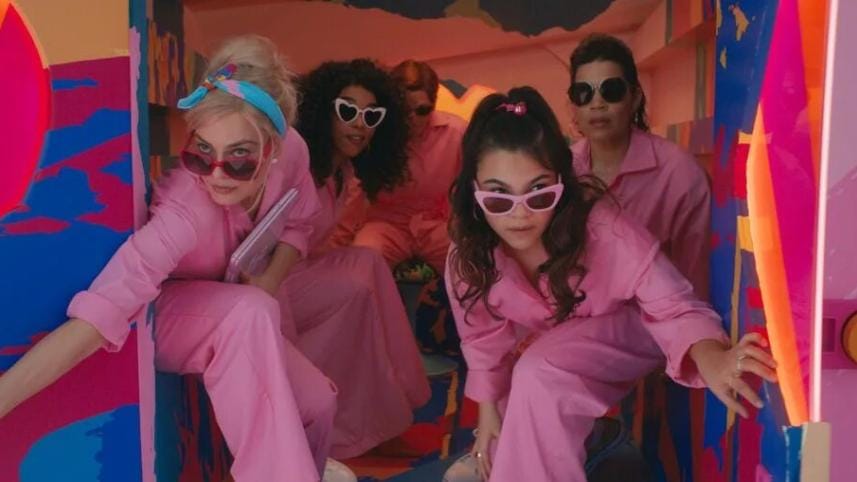‘Barbie’: A fearless plunge into the neon pink abyss

The iconic Mattel doll has served as the vehicle for our hopes, desires, fantasy as well as animosity for 6 decades now. The movie captures the spirit of Barbie's timeless appeal which is beloved by generations of children who spent hours playing with Barbie and her friends Ken, Midge, Skipper, and Allan.
Barbie can be seen in almost every guise, including Stereotypical Barbie (played by Margot Robbie with great panache), President Barbie (underutilized and consistently entertaining Issa Rae), Doctor Barbie (Hari Nef), Lawyer Barbie (Sharon Rooney), Disheveled Barbie (Kate McKinnon), etc. Overall, the Barbies are diverse in terms of ethnicity and body image, including a wheelchair-using Barbie. They all live together in Barbie Land, which is exquisitely portrayed, with gorgeous vistas, vibrant backdrops, and well crafted characters.

Greta Gerwig, who co-wrote the script with Noah Baumbach, draws inspiration from "The Truman Show" and "Toy Story" as they plunge the protagonist into an existential crisis brought on by a glimpse into the real world that is encroaching on Barbie's synthetic, comforting idyll.
This seemingly casual excursion is meant to give the movie depth and substance. Barbie becomes plagued with regret and mortality-related ideas as she realizes that the outside world is a far cry from her delirious fantasy land. She and the other Barbies grapple with the idea of whether Barbie dolls are demeaning or empowering.

On the other hand, Ken is busy filling his empty head with all the patriarchal lies as Barbie goes through a rude awakening. Ken learns that women are inherently held subordinate to men in the Real World, an idea he brings back to Barbie Land where it has the glaringly ludicrous effect of brainwashing all the women into acting like submissive housewives.
"Barbie" acts as a dazzling mirror, examining social norms, deconstructing stereotypes, and boldly tackling underlying themes of the human race such as gender inequity and toxic masculinity issues.
Gerwig's strategy is skewed more toward audiences who want to indulge in nostalgia as there are subtle references and inside jokes throughout the movie. Even though Gerwig occasionally uses the film as the vehicle for what seems like a gender studies lecture for undergraduates, it is evident that the movie was created by professionals who understand how children's imaginations develop while playing with Barbies. The majority of its messages are encouraging for young girls, while those that gave the movie its PG-13 rating might pass them by as they indulge in all the visually pleasing scenes and costumes.
I was amazed by the technical depth of the Barbie world and the mixed styles of filming used to juxtapose reality from fantasy. The musical numbers in the movie left a lasting impression, as the catchy tunes and fantastic choreography enhanced the story and added an extra level of enjoyment.
Robbie is an excellent actor who excels at balancing perfection and chaos. Ryan Gosling as Ken is a match made in heaven as he sports a range of expressions, as the helpless pretty boy. He is the true comedic gem and exemplifies how the pervasive nature of patriarchy can sink its teeth into even the most naïve men. However, this begs the question why let Ken steal the spotlight if "Barbie" is all about highlighting and honoring women?
At times, the monologues, humor and bitter ironies presented a commercialized and co-opted version of feminism, which is as good as it gets when the move is produced by Barbie's corporate manufacturer Mattel. The script feels most daring when the movie calls out Mattel for the high and unreachable ideals it placed on women through fuchsia hegemony.
The script could have done away with some unnecessary scenes and put in more nuance and subtlety. Maybe have more Barbie and Ken in the real world. They should have been able to empower women without victimizing them, and especially not have the women fight back using petty ways.
At least, the script is self-aware. It is hysterical but there are also times when it feels a little demure and restrained, as if the want to be funny can only be harsh and caustic. Regardless, the writers had enough faith in the script to leave it open for a sequel. The ending steered clear of clichés like romance or the "hero saves all" theme.
The movie does not just boast zaniness and charm, it is proof of what is possible even in the darkest recesses of capitalism. "Barbie" is an innovative and subversive film which is gearing up to be one of the biggest summer blockbusters in recent memory.




 For all latest news, follow The Daily Star's Google News channel.
For all latest news, follow The Daily Star's Google News channel. 
Comments